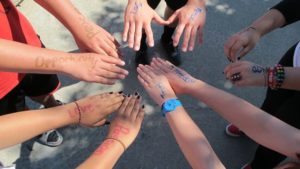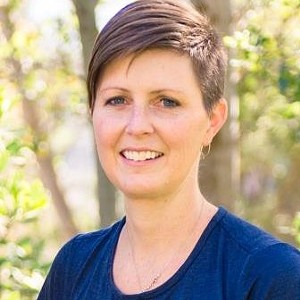
On a quiet Friday afternoon, most of OC Human Relations staffers are out in the field as always, but there’s an absence of another kind at the Santa Ana office that isn’t quite as common. Rusty Kennedy, the nonprofit’s longtime CEO, retired before the holidays leaving behind a legacy as towering as his 6-foot-6 stature. For decades, he served as the county’s consummate liberal, working on the impossible tasks of improving community-police relations and taking on OC’s penchant for bigotry all while drawing scorn from right and left alike.
From her desk, Alison Edwards offers a fitting analogy of a rowing boat that moves forward while looking back that has guided OC Human Relations for the first few weeks this year under her helm. “I want Kennedy’s work to inform the organization,” she says. “We’d be shortsighted to move forward without honoring that legacy.” The path that lies ahead appears daunting beyond the big shoes left to fill. The Orange County Human Relations Commission’s annual hate crime report in 2017 showed a concerning spike in reported incidents, no doubt fueled by the divisive rhetoric of the 2016 presidential election.
They’re also in the middle of a one-year reprieve given by the Orange County Board of Supervisors, who granted funding contingent on there being a clearer distinction between the commission, a small government agency, and the private nonprofit. The commission came first in 1971 after a murder trial of Black Panther accused of slaying an officer stoked racial tensions between African-Americans and Santa Ana police. Kennedy started working for the commission in 1977 and became its executive director four years later; a title he held until February when Norma Lopez succeeded him.
The nonprofit was created in 1991 at the suggestion of the board. “We existed to support the work of the commission,” Edwards says. “The two actually did quite well together.” But over the years, the Board has whittled down the commission to just three paid positions whereas the nonprofit touts a staff of more than 20. To make a buffer between the two more visual, Edwards led the effort to move OC Human Relations out of the basement of a government building in Santa Ana it called home for many years. As of November, the nonprofit’s new office is inside a Santa Ana building owned by Big Brothers Big Sisters of Orange County where they finally have windows.
 With the challenges that greet Edwards at the beginning of her tenure as CEO, it’s a good thing she’s no outsider or newcomer. Edwards got hired at OC Human Relations in 1998, starting out with its heralded BRIDGES program in the county’s schools. She recalls an early eye-opening experience as a teen walking hand-in-hand through a mall with her black boyfriend at the time to south county stares. After graduating college, a 23-year-old Edwards was surprised find a workplace back home committed to drawing down stereotypes, especially in the schools.
With the challenges that greet Edwards at the beginning of her tenure as CEO, it’s a good thing she’s no outsider or newcomer. Edwards got hired at OC Human Relations in 1998, starting out with its heralded BRIDGES program in the county’s schools. She recalls an early eye-opening experience as a teen walking hand-in-hand through a mall with her black boyfriend at the time to south county stares. After graduating college, a 23-year-old Edwards was surprised find a workplace back home committed to drawing down stereotypes, especially in the schools.
The extensive background with the nonprofit gives her insight into what directions it must go in order to meet the needs of a changing county. “Looking at the schools, they’re more segregated now than when I was working in them,” she says. With the opportunities to do inter-ethnic relations work like in days of old few and far between, she helped initiate restorative justice programs that have taken hold at four middle school sites in Anaheim and Tustin.
“The demographics of the staff and faculty certainly don’t reflect the student population,” Edwards says. “Right now, we’re going about the business of getting teachers and students to feel like they can engage.” Restorative justice in schools seeks to draw down and provide alternatives to detentions, suspensions and expulsions. The approach has its merits. Edwards shares a recent story of a young girl who showed up to her middle school’s “RJ” room instead of punching another girl in the face.
“When I think about the opportunities I see in the county, there’s some really exciting things happening,” Edwards adds. She wants to see how government institutions can better respond to the work of a nexus of nonprofits to ensure that progress made with individuals and communities doesn’t become undone. “Our vision moving forward is to continue to try and create an equitable county,” she says.
Edwards’ old mentor knows he left the nonprofit in good hands in moving towards that goal. “During her 20 years at OC Human Relations, she has worked at every level and program,” Kennedy says. “She is a terrific teacher who is always challenging her staff. Her measures are quantifiable progress.”
But it’s what Edwards comes home to from work every day that gives her the most hope in uncertain times. She sees a diverse group of kids in her neighborhood play without the faintest hint of bigotry. “They’re at the age where they’re just around the kids they like to be around,” she says. “I have to believe that they’re going to experience a world that’s going to be good to them.”

Gabriel San Román is from Anacrime. He’s a journalist, subversive historian and the tallest Mexican in OC. He also once stood falsely accused of writing articles on Turkish politics in exchange for free food from DönerG’s!

